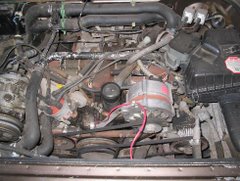We decided to dismiss buying a second hybrid until a plug-in version is available, and have been focusing on cheap, high-mileage vehicles. We considered diesels -- that would give us the option of a future veggie-oil modification -- but finally concluded that the older diesels in our price range were too polluting to drive regularly and mostly too large for our needs.
So it's gasoline for us at the moment. (Blush.) Right now we're looking at Hondas, who deserve props for having the highest average fuel economy across their fleet. (Of course we're looking at older cars, not recent models -- but remember that average fuel economy has actually been declining over the years -- you can read all about that on the links at the end of this post.)
But what will become of the e-Vanagon? Never fear! I had a lovely summit breakfast with Lynn and Bill at the end of February and we began planning for an electric vehicle conversion workshop to be held in the summer of 2009. There are a couple of possibilities as far as a donor vehicle: we could sell the e-Van and use the funds to buy the materials for a different conversion. Or, we could strip the e-Van and have the class rebuild it. It's a good teaching vehicle because its size allows several small groups to work on it at once during the hands-on portion of the day. And I think we could then do the conversion in a week instead of two, which would make the workshop a lot more accessible to folks who have a limited number of weeks in their year! (Don't we all?!)
I've put in an application for funding for the class, and there are other possibilities for financing it if that one doesn't come through -- so stay tuned! You can sign up to get email notification of plans for the 2009 workshop as they unfold at "info at buckscountyrenewables.org" (resisting spam harvesters by spelling out the email address for you).
Have some charts and two good reading links for you that I've garnered during my researches on fuel economy. The first set is from fueleconomy.gov. The chart below (charmingly titled "Cars That Don't Need Gasoline") details the different alternative-fuel vehicles commercially available during the last 8 years. It's just a jpeg, so you won't be able to click through the links in the pic, but you can see it better if you click to enlarge it:
 Note how in the last five years our alternative fuel options have dwindled! In 2003 you could still acquire my dream car, the RAV-4 EV (in production 1997-2002). Check out the MPG and the teeny GHG emissions figures:
Note how in the last five years our alternative fuel options have dwindled! In 2003 you could still acquire my dream car, the RAV-4 EV (in production 1997-2002). Check out the MPG and the teeny GHG emissions figures:
Sigh ... that car had an 80 - 100 mile range, by the way (enough to complete our daily sixty-six miles), and some of them are still on the road today getting the same performance out of their NiMH battery packs. (Toyota eventually stopped collecting and destroying the vehicles in the face of an organized campaign, Don'tCrush.com, conducted by EV advocates turned activists. As documented in Who Killed The Electric Car? the initial protests by EV owners didn't deter GM from destroying all the extant EV-1s.)
I could go on and on about the RAV4 EV and how Texaco-Chevron put a halt to the manufacture of the large NiMH batteries that demonstrate that existing technology could be powering usable production EV's right now, and how mad that makes me, but I'll spare you any more and direct you to a couple of interesting reports on the issue of fuel economy instead: first, a clarion call from the US Congressional Joint Economic Committee to raise CAFE standards
and second, a frank look at US fuel economy trends by a Wall Street Journal columnist. Fun stuff.
Till next time!
J.




